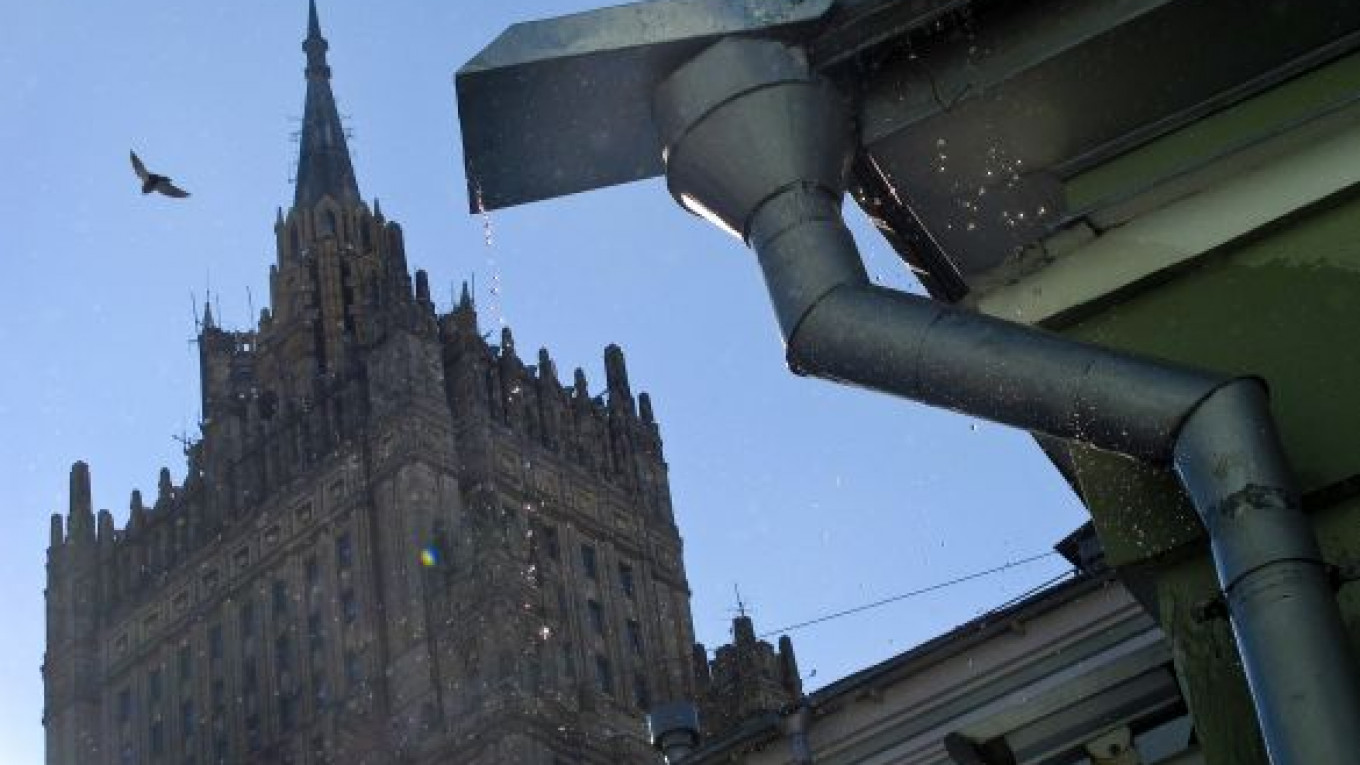"Sexism" and "low pay" are the name of the game at the Foreign Ministry, and the country's middle class is growing but remains devoid of a political conscience, according to new U.S. diplomatic cables released by WikiLeaks.
The whistleblowing web site 133,887 cables over the last week — its biggest single batch yet — in an apparent attempt to reclaim its place in the public spotlight.
The Russia-related part of the exposés is too harmless to damage the plodding "reset" between Moscow and Washington, but offers instructive glimpses into challenges of Russian diplomats and well-off citizenry in general, an international affairs analyst said.
The life of Russian diplomats, as reflected by their American counterparts, is described in a lengthy signed by U.S. Ambassador John Beyrle in 2008.
While U.S. diplomats "frequently meet open and engaging Russian diplomats, the unique nature of the Foreign Ministry contributes to the challenging environment" in which they work in Russia, according to the cable.
"Sexism runs rampant" at the ministry dominated by men, where only 15 percent of Russian diplomats are women, said the cable, marked as "sensitive" and "unclassified, for official use only."
The ministry's chief of personnel, Vladimir Morozov, saw nothing wrong with the male dominance at his agency, the report said.
"Men were better equipped to handle long-term absences from home, harsh climates, and the 'complex political and military situations' in which Russian diplomats often found themselves," Morozov was cited as saying.
This is why the Foreign Ministry "remains a bastion of Slavic males who went to Moscow's top schools," where education costs thousands of dollars, even as the staff of the U.S. Foreign Service has become "more diverse," the cable said.
Access to ministry jobs is limited by the real estate market, among other things. Most diplomats are Muscovites with their own housing because people from the provinces cannot afford an apartment in Moscow on a ministry salary, which ranges from $150 to $4,000 a month.
Real estate also defines many a diplomat's life: Male ministry employees are frequently married to women employed in the private sector who earn more than their husbands, the cable said.
Russian diplomats also complained to their U.S. colleagues that they sometimes have to leave their families at home when posted abroad because of a lack of schools for their children. Small diplomatic missions often have no Russian-language schools, or only classes for small children.
A spokesman for the Foreign Ministry declined to immediately comment on the issue when reached by telephone Monday.
A separate cable sent by Beyrle's predecessor, William Burns, in 2006 focuses on Russia's middle class, which it said was finally emerging but still a way off from growing politically active.
"The middle class is finally stepping out of the shadows," Burns said in the cable in Kommersant on Monday. "There must be someone other than the mega-rich, after all, to buy these TV sets, cars and mobile phones."
The middle class is interested in politics, but given Russian political traditions, "it shouldn't be expected to swiftly transform into activism," Burns writes in the cable, cited in Russian.
But eventually, the cable said, well-salaried Russians will want to "have a voice and influence on how their country is managed and how to spend their money."
Another cable specifically cites the skyrocketing popularity of social networks and an expansion of fitness chains in Russia as proof of the growing middle class. Curiously, interviews with several gym owners showed that many people are taking up sports following a fad started by Prime Minister Vladimir Putin, who often flaunts before cameras his love for judo, skiing and fishing.
WikiLeaks had its "moment of glory" — in President Dmitry Medvedev's words — in 2010 when it published a classified video of a disputed American military operation in Iraq and has since emerged as a unique source for U.S. State Department cables.
But its clout has been waning recently, both due to lack of new publications and scandals surrounding WikiLeaks' Australian-born founder and chief, Julian Assange, who is accused of rape in Sweden.
Recent publications are likely aimed at drawing the attention back to the web site, but it will have no significant political impact, said Oleg Terebov, a researcher with the Moscow-based Institute for the United States and Canada.
As for U.S.-Russian relations, "WikiLeaks has never been influential," Terebov said in a telephone interview. But they might show what Americans find interesting in Russia, he added.
A Message from The Moscow Times:
Dear readers,
We are facing unprecedented challenges. Russia's Prosecutor General's Office has designated The Moscow Times as an "undesirable" organization, criminalizing our work and putting our staff at risk of prosecution. This follows our earlier unjust labeling as a "foreign agent."
These actions are direct attempts to silence independent journalism in Russia. The authorities claim our work "discredits the decisions of the Russian leadership." We see things differently: we strive to provide accurate, unbiased reporting on Russia.
We, the journalists of The Moscow Times, refuse to be silenced. But to continue our work, we need your help.
Your support, no matter how small, makes a world of difference. If you can, please support us monthly starting from just $2. It's quick to set up, and every contribution makes a significant impact.
By supporting The Moscow Times, you're defending open, independent journalism in the face of repression. Thank you for standing with us.
Remind me later.






